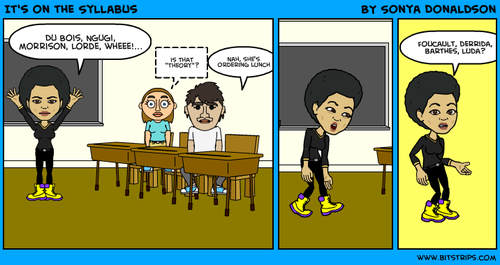Compassionate Teaching

As a college instructor who speaks publicly many times a week, I found Scott Berkun’s book Confessions of a Public Speaker full of tips and ideas on how to improve my speaking and teaching. Some of his suggestions are for any speaker and some are specifically focused on teaching and lecturing in the classroom. The following points were ones that I found important for my context:
1. Throw out the notion of perfection. (4)
Berkun explains that even some of the greatest public speakers, including Martin Luther King, Malcolm X, and Winston Churchill, had mistakes in their unedited transcripts. However, we tend to forgive mistakes in spoken language. And most of the time people don’t remember the mistakes. He explains that what matters is how we frame the mistakes. There are two ways to do this: 1. “Avoid the mistake of trying to make no mistakes,” and 2. “Know that your response to a mistake defines the audience’s response.”
It is so very true that my students tend to react how I react to a mistake I make. If I laugh they tend to laugh and we are able to move forward with ease in the classroom.
2. Fear and stress are natural reactions. (21)
Our bodies respond in ancient ways to stress and this is a good thing as our bodies are trying to keep us alive. Two points he makes that I found interesting and helpful are: getting to the venue early, sitting in the seats where your audience will sit, walk around the room so your body gets used to the environment, workout ahead of time in order to calm down the body’s fear response. These are all things that I could apply to my classroom.
3. The best teachers focus on the students’ needs. (131)
Specifically, we should focus on the following students’ needs: emotional confidence, physical comfort, and intellectual curiosity.
There are many ways to address these needs. For emotional confidence I try to be aware of my student’s moods. I have over 100 students each semester but somehow have an ability to know if one is struggling emotionally. Typically I will either call, email or talk to the student privately in order to assess the situation. This has paid off very well as students tend to appreciate that someone cares about him/her and his/her success in the class. Regarding physical comfort, I tend to allow my students to bring drinks and snacks into the classroom (especially for lengthy classes.) I also give them breaks for classes that last two hours or more. In order to keep them intellectually curious I try to keep my attention on the pulse of the classroom. If I feel them getting restless we will switch to a new topic or do a different activity surrounding the same topic. This helps them stay attentive and engaged. I also give them opportunities to discuss things they are curious about or topic on which they would like to learn more.
4. Silence. (158)
Berkun quotes Donald Bligh in What’s the Use of Lectures? and states, “Silence between teachers’ remarks is a very important part of a lecture. Silence provides time for consolidation and thought.” Instead of using “filler sounds” like “umm” and “uhh” it is important to allow for silence. By creating this sound space listeners can process the previous point. Whereas, if one only uses “filler sounds” the listeners don’t know when the point has been made. It is interesting in my classroom how when I stop in the middle of a lecture I can regain the focus and attention of my students. Sometimes I will do this before I ask them a question about what has just been taught; or I might create a silent space for them to think before asking their questions.
Finally, I found one quote by Berkun deeply inspiring and motivating. He states, “Teaching is a compassionate act. It transforms the confusing into the clear, the bad into the good. When it’s done well, and the insights are experienced not just by the teacher but by the students as well, everyone should feel good about what’s happened.” (135)
Do any of the above points seem like they might help you in your public speaking endeavors?
Do you have any other suggestions for teachers?
Leave a Reply
You must be logged in to post a comment.